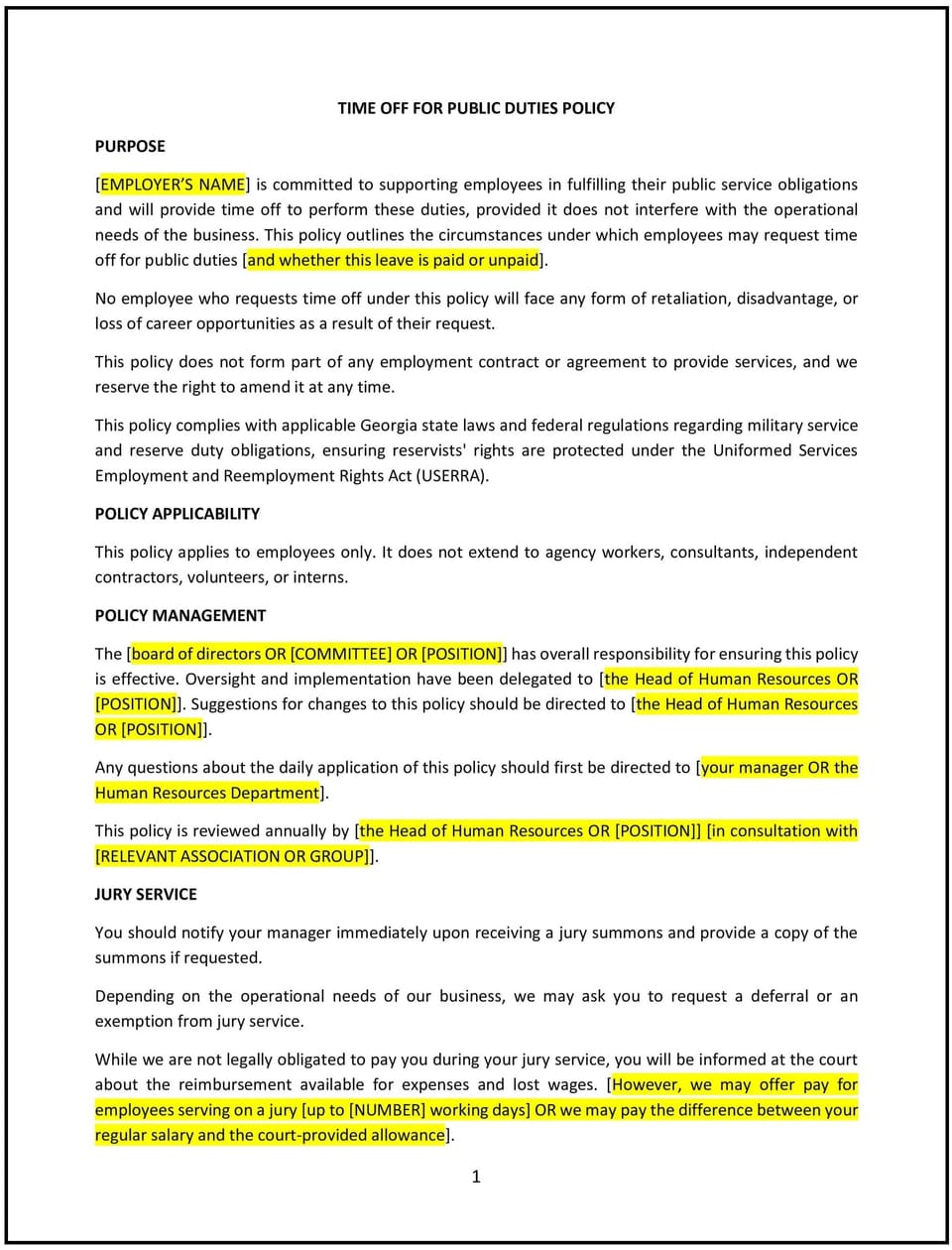Time off for public duties policy (Georgia): Free template

Time off for public duties policy (Georgia)
This time off for public duties policy is designed to help Georgia businesses support employees who participate in civic activities such as serving on a jury, acting as a witness in court, or engaging in other public responsibilities. The policy outlines eligibility, procedures for requesting leave, and expectations during the leave period.
By implementing this policy, businesses can promote civic engagement, support employees’ legal obligations, and maintain operational clarity.
How to use this time off for public duties policy (Georgia)
- Define public duties: Specify which activities are covered under the policy, such as jury service, acting as a court witness, or participating in public boards.
- Clarify eligibility: Identify the employees eligible for time off, considering factors like employment status and role.
- Establish notification procedures: Require employees to provide advance notice of public duty obligations, along with supporting documentation, such as a jury summons.
- Address pay guidelines: Clearly outline whether the time off is paid, unpaid, or partially paid, and provide details about reimbursement for public duty compensation, if applicable.
- Maintain communication: Set expectations for employees to stay in touch about the anticipated length of their absence and any changes to their public duty obligations.
- Protect job security: Emphasize that employees will not face adverse consequences for taking time off for public duties, as per Georgia laws.
- Review regularly: Periodically assess the policy to reflect updates in Georgia laws or organizational needs.
Benefits of using this time off for public duties policy (Georgia)
Implementing this policy provides several advantages for Georgia businesses:
- Supports civic responsibility: Encourages employees to engage in public service without undue workplace stress.
- Promotes fairness: Ensures that all employees have equal opportunities to fulfill their legal and civic obligations.
- Enhances morale: Demonstrates the business’s commitment to supporting employees’ rights and responsibilities.
- Maintains clarity: Clear procedures help both employees and employers manage public duty absences effectively.
- Reflects Georgia-specific practices: Tailoring the policy to state requirements ensures its relevance and compliance.
Tips for using this time off for public duties policy (Georgia)
- Communicate clearly: Ensure employees are aware of the policy and understand their rights and responsibilities.
- Provide flexibility: Work with employees to minimize disruptions during their absence, such as redistributing tasks or adjusting deadlines.
- Keep accurate records: Document all requests for public duty leave, along with relevant correspondence and approvals.
- Offer guidance: Provide resources or contact information for employees with questions about public duty leave.
- Monitor feedback: Use employee input to refine the policy and address any concerns.
Q: What types of public duties are covered under this policy?
A: Covered duties typically include jury service, acting as a court witness, or serving on public boards or commissions.
Q: How should employees request time off for public duties?
A: Employees should notify their supervisor or HR as soon as possible and provide documentation, such as a jury summons or subpoena.
Q: Is time off for public duties paid?
A: Businesses should specify in the policy whether such time off is paid, unpaid, or partially paid, based on organizational practices and Georgia laws.
Q: Can businesses require employees to return to work after a partial day of public duty?
A: Businesses may request employees return to work if their public duty obligations do not require a full day, provided this is reasonable and practical.
Q: How should businesses handle extended public duty absences?
A: Businesses should maintain communication with the employee to manage workload adjustments and provide updates on the expected duration of the absence.
Q: Are employees protected from retaliation for taking public duty leave?
A: Yes, businesses should ensure employees face no adverse actions for fulfilling their public duty obligations, in line with Georgia regulations.
Q: How often should this policy be reviewed?
A: The policy should be reviewed annually or as needed to reflect changes in Georgia workplace practices or legal requirements.
This article contains general legal information and does not contain legal advice. Cobrief is not a law firm or a substitute for an attorney or law firm. The law is complex and changes often. For legal advice, please ask a lawyer.


